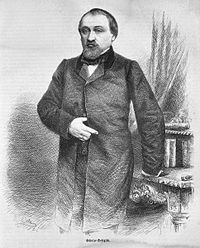Franz Hermann Schulze-Delitzsch
| Hermann Schulze-Delitzsch | |
|---|---|

Schulze-Delitzsch in 1863, Leipzig.
|
|
| Born |
29 August 1808 Delitzsch, Saxony |
| Died | 29 April 1883 (aged 74) Potsdam, German Empire |
| Nationality | German |
| Institution |
Prussian National Assembly, Reichstag |
| Field |
Microfinance Microeconomics |
| School or tradition |
Co-operative economics |
| Alma mater |
Leipzig University Heidelberg University (Hc) |
| Influences | |
| Influenced | |
| Contributions |
Credit Union Bond of association Cooperative banking |
Franz Hermann Schulze-Delitzsch (29 August 1808 – 29 April 1883) was a German politician and economist. He was responsible for the organizing of the world's first credit unions. He was also co-founder of the German Progress Party.
Schulze-Delitzsch was born at Delitzsch, in Saxony. He studied law at Leipzig and Halle universities and, when thirty, he became an assessor in the court of justice at Berlin. Three years later he was appointed patrimonial-richter at Delitzsch. Entering the parliament of 1848, he joined the Left Centre. At this time, his surname was expanded from Schulze to Schulze-Delitzsch: the name of his birthplace was appended to his surname to distinguish him from other Schulzes in the Prussian National Assembly. Acting as president of the commission of inquiry into the condition of the labourers and artisans, he became impressed with the necessity of co-operation to enable the smaller trades-people to hold their own against the capitalists.
He was a member of the Second Chamber in 1848-1849; but as matters ceased to run smoothly between himself and the high legal officials, he gave up his public appointments in October 1851, and withdrew to Delitzsch. Here he devoted himself to the organization and development of co-operation in Germany, and to the foundation of Vorschussvereine (peoples' banks), of which he had established the first at Delitzsch in 1850. These developed so rapidly that Schulze-Delitzsch in 1858, in Die arbeitenden Klassen und das Assoziationswesen in Deutschland, enumerated twenty-five as already in existence. In these banks, the subscribers made small deposits, obtaining proportional credit and dividends. The management was vested in a board composed of subscribers.
In 1859 the more than 200 such banks were centrally organized under the direction of Schulze-Delitzsch. He promoted the first Genossenschaftstag, a co-operative meeting, in Weimar, and founded a central bureau of co-operative societies. In 1861 he again entered the Prussian Chamber, and became a prominent member of the Progressist party. In 1863 he devoted the chief portion of a testimonial, amounting to £7500, to the maintenance of his co-operative institutions and offices. This, however, was only to meet an exceptional outlay, for he always insisted that they must be self-supporting. The next three or four years were given to the formation of local centres, and the establishment of the Deutsche Genossenschafts-Bank, 1865.
...
Wikipedia
